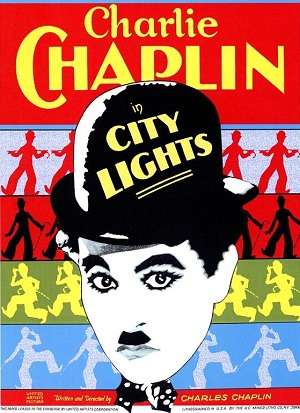City Lights
 | This page needs some cleaning up to be presentable. Needs a radically different description that feels less like a Wikipedia article. |
|---|

"A Comedy Romance in Pantomime"—Opening Titles
City Lights is a 1931 American silent romantic comedy film starring, written by and directed by Charlie Chaplin. It also stars Virginia Cherrill and Harry Myers. Despite the fact that the production of silent films had dwindled with the rise of "talking" pictures, City Lights was immediately popular and is today remembered as one of the highest accomplishments of Chaplin's prolific career. Although classified as a comedy, City Lights has an ending widely regarded as one of the finest and most moving in cinema history.
The plot involves Chaplin as The Tramp, falling in love with a blind flower girl (Cherrill) he meets on the street. Later he convinces a drunken millionaire (Myers) not to commit suicide, and the Millionaire proclaims the Tramp his friend for life. This lasts for as long as the Millionaire is drunk, of course. Oddly enough the Millionaire forgets who Chaplin is while sober, but remembers him again when drunk. Chaplin uses this new temporary millionaire status to woo the flower girl by buying all her flowers and driving her home in the Millionaire's car, and later by trying to pay for her rent and for an operation which will help her see again, using the Millionaire's money. This, of course, does not go over too well once the Millionaire sobers up.
In 1992, City Lights was selected for preservation in the United States National Film Registry by the Library of Congress as being "culturally, historically or aesthetically significant". In 2007, the American Film Institute's 10th anniversary edition of "100 Years...100 Movies" named City Lights the 11th greatest American film of all time (a dramatic change from its original standing of #76), making it the highest-ranking silent film.
- Agony of the Feet: When the Millionaire drops a rock on the Tramp's foot. The Millionaire had tied the rock to his neck in order to drown himself. Also, when the Butler slams the door on the Tramp's foot.
- The Alcoholic: The Millionaire.
- Bedmate Reveal
- Bittersweet Ending / No Ending: Don't you want to know what will happen next?
- Disabled Love Interest
- Dramatic Curtain Toss
- Driven to Suicide: The Tramp prevents a millionaire from killing himself by talking him out of it. The Millionaire tends to get suicidal whenever he's drunk.
- Epic Tracking Shot / The Oner: The Tramp is peeking in the blind girl's window. The camera moves from the window across the living room to show the blind girl, sick in bed. An Epic Tracking Shot for Chaplin, who generally stuck to his old-fashioned silent movie directing style where the camera hardly ever moved.
- Exploding Calendar
- Good Old Fisticuffs Perhaps the funniest boxing match ever filmed.
- Ho Yay: From a modern point of view, the Tramp with almost every male character in the movie...
- Particularly with his second boxing opponent. The Tramp smiles and waves, primping a bit with his hat as the boxer starts to change...the boxer decides to step behind a curtain before taking his pants off.
- I Kiss Your Hand: several times: Chaplin to the blind girl, the blind girl to Chaplin, Chaplin to a random guy thinking he's the blind girl...
- Innocent Flower Girl
- Interrupted Suicide: The Millionaire is about to tie a millstone around his neck and throw himself in the river when Charlie stops him.
- In Vino Veritas: The Millionaire is all chummy with Chaplin while drunk, but once he sobers up...
- ISophagus: Chaplin swallows a whistle at one point, and whistles whenever he hiccups, attracting a taxicab and several dogs.
- Male Gaze: The Tramp sure spends a lot of time looking at that nude female statue...
- Mock Millionaire: Charlie.
- No Name Given: For anyone in the cast, really.
- Rags to Riches: By a lucky association with the Millionaire, Chaplin accomplishes this.
- Romantic Comedy: In pantomime!
- Sight Gag: During the opening scene, the Tramp stands near the outstretched hand of one statue, effectively thumbing his nose at the crowd.
- Silence Is Golden: The entire movie. Notable since it was released two years after the rest of Hollywood had abandoned silent films for talkies.
- Speaking Simlish: Though it's a silent film, the speech given at the beginning to dedicate a statue is performed over a kazoo, while the serenade at the Millionaire's party is performed by a trumpet with wa-wa mute. Knowing Chaplin, this is likely a Take That against the pressure for the Tramp to get with the times and make a 'talking' picture.
- Temporary Blindness: The blind flower girl. She gets an operation to restore her sight thanks to the Tramp.
- Throwing the Fight: In order to raise money for the blind girl, Chaplin enters a boxing match. His first opponent arranged for them to throw the match and split the prize money, but he had to leave, and Chaplin's new opponent wants all the prize money for himself. And he knocks people out in a single punch.
- The Tramp: But of course.
- What Did I Do Last Night?: The Millionaire, after he sobers up, does not even remember who Chaplin is or that they'd spent an entire night and day hanging out and partying. After he gets drunk again, though, the Millionaire remembers him. Hilariously, they even wake up in bed together at one point without the Millionaire recognizing Chaplin. A completely heterosexual play on the trope of course.
- Wire Fu: Wires are actually visible in the boxing scene.
- Wrong Side of the Tracks